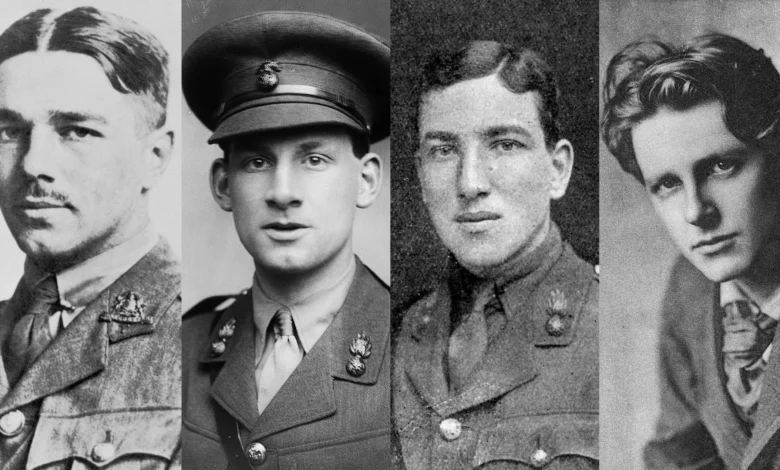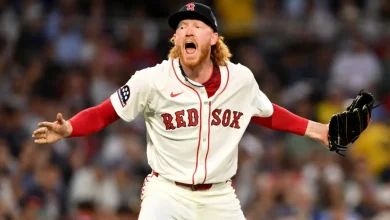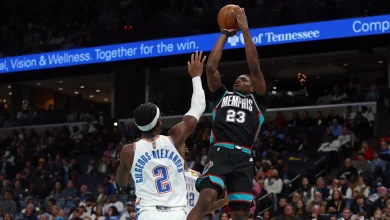Four queer WWI poets the world must remember on Armistice Day

On Armistice Day we’re remembering the queer poets of World War One. (Getty)
On Armistice Day we’re remembering the queer poets of World War One. (Getty)
Today (11 November) marks Remembrance Day, also known as Armistice Day, which means a chance to stop and think about those who fell during the First World War, as well as other conflicts since then.
While the day, and in particular the wearing of the red poppy, which has been co-opted by some on the far right especially, has become the topic of debate in recent years, it is also a chance to remember the gay poets who defined what has become known as the doomed generation.
Wilfred Owen, Siegfried Sassoon, Robert Graves and Rupert Brooke all became famous for their works written about and during The Great War.
Wilfred Owen
Wilfred Owen wrote much of his most-famous poems in a one-year period. (Fotosearch/Getty Images).
The majority of Wilfred Owen’s poetry was written over the course of about one year, between August 1917 and September 1918.
A fan of the romantic poets Keats and Shelley, Owen had been interested in the subject for years but it was his time recovering from shell shock at the Craiglockhart War Hospital, in Edinburgh, where he met Sassoon, that inspired poems such as Dulce et Decorum Est (It is Sweet and Proper) and Anthem for Doomed Youth.
Owen and Sassoon are believed to have enjoyed a romance. They also worked on poetry together, influencing each other. The former’s work is often considered homoerotic. He died in 1918 – just one week the armistice, which brought the fighting to an end, was signed. He was 25.
His mother was notified by telegram as bells rang out across Britain on 11 November, to mark the coming of peace.
Siegfried Sassoon
Siegfried Sassoon survived the slaughter in the trenches and lived to be 80. (George C. Beresford/Hulton Archive/Getty Images)
Unlike Owen, Sassoon was a published poet before the two met. After writing the controversial letter Finished With the War: A Soldier’s Declaration, in which he called the fighting “evil and unjust,” Sassoon was sent to Craiglockhart by the authorities who deemed him unfit for service rather than stage a court-martial which would have caught the public’s attention given his fame.
Meeting Owen there, he encouraged his younger counterpart to write more realistically rather than romantically. Sassoon is known to have had several male lovers, including actor Ivor Novello and socialite Stephen Tennant. His most-famous poems include Suicide in the Trenches and The Old Huntsman.
Sassoon certainly had romantic feelings which he expressed through his poetry, to Robert Graves with whom he fought. His story is the focus of Terence Davies’ 2021 film, Benediction. He was played by James Wilby in Regeneration, which also features Owen and Robert Graves (Dougray Scott), almost 25 years earlier.
Robert Graves
Robert Graves lived until 1985. (Bridgeman via Getty Images)
Robert Graves and Sassoon bonded over their experiences on the frontline, writing intimate poetry to and about each other.
Graves appeared to have “disavowed any homosexual feelings he’d ever possessed” by the end of war, according to Oxford University researchers who described the love between the pair as “palpable”. Like Sassoon, he survived the war and died in 1985.
Among his most-famous works are Two Fusiliers and Goliath and David.
Rupert Brooke
Rupert Brooke was said to be bisexual. (Culture Club/Getty Images)
Described by WB Yeats once as “the handsomest young man in England,” Brooke is remembered for his more-idealistic poetry, including the hauntingly prophetic The Soldier. He was a revered poet by the time he died aged 27 in 1915.
His letters suggest that he was bisexual and that he struggled with this aspect of his identity.
Writing in Taking It Like a Man, Adrian Caesar says Brooke considered “the bisexual position to be impossible” and believed his sexuality prevented him from loving anyone wholeheartedly.
Brooke is also thought to have belonged to circles that were either gay or straight but had no one who occupied the middle ground, an issue with representation that persists today.
Share your thoughts! Let us know in the comments below, and remember to keep the conversation respectful.





